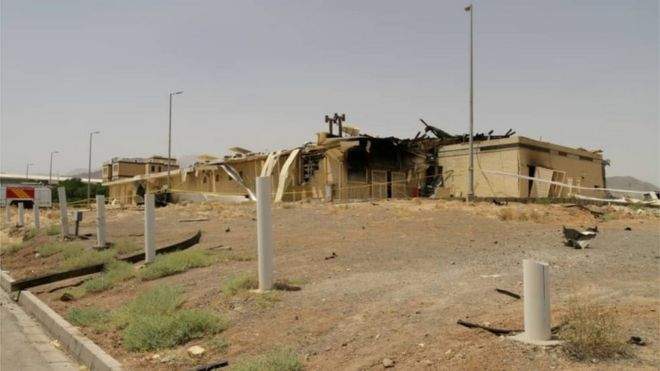Iran explosions: Officials deny reports of fresh blast

Iranian officials have denied reports of an explosion west of the capital Tehran on Thursday, the latest in a series of mysterious blasts to hit the country in recent weeks.
Social media users reported hearing explosions in the nearby cities of Garmdareh and Qods, state media said.
It is not clear where the reported incident took place.
Key sites including nuclear facilities and oil refineries have been damaged in recent incidents.
In July Iran's Atomic Energy Organisation confirmed a fire took place at a nuclear plant in Natanz. The incident is reported to have set back Iran's nuclear programme.
Rumours of the latest incident began circulating online at around midnight on Thursday, according to reports by state-run IRIB news agency.
Locals reported hearing three or four mortar-like sounds similar to anti-aircraft weapons, reported government-run Press TV.
A small number of social media accounts claiming to be from Garmdareh reported hearing sounds, according to analysis by BBC News, but images of fire and damaged buildings circulating online were found to be old.
Qods governor Leila Vaseghi told government-run news agency IRNA that a short power outage occurred in the city but it was linked to a hospital.
The member of parliament for Qods also denied that an explosion happened in the city and said the power outages were related to the routine activities of the local power company.
The major of Garmdareh said the sound heard locally was an "explosion at a factory making gas cylinders", according to the New York Times.
What other incidents have taken place?
Since late June there have been several unexplained fires or blasts at sensitive sites:
26 June: Blast at a liquid fuel production facility for ballistic missiles in Khojir, close to Parchin, near Tehran; fire at power plant in Shiraz, causing a blackout30 June: Explosion at a medical clinic in Tehran, 19 people killed2 July: Blast and fire at Natanz nuclear site3 July: Large fire in Shiraz4 July: Explosion and fire in power plant in Ahwaz; chlorine gas leak at Karoun petrochemical plant in Mahshahr
The Supreme National Security of Iran says the cause of the explosion at Natanz nuclear site has been determined but cannot currently be announced due to security reasons.
Some Iranian officials told Reuters news agency that Israel is suspected of bombing the site.
When asked if Israel was behind the incident, Israel's foreign minister responded "our actions in Iran [are] better left unsaid".
Photo: Reuters - File photo of a nuclear facility Natanz that was damaged in a fire in July




